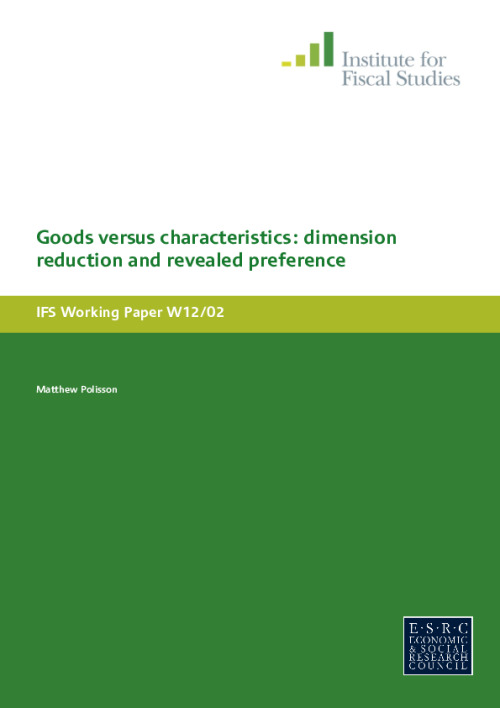Downloads

wp1202.pdf
PDF | 484.65 KB
<p><p>This paper compares the goods and characteristics models of the consumer within a non-parametric revealed preference framework. Of primary interest is to make a comparison on the basis of predictive success that takes into account dimension reduction. This allows us to nonparametrically identify the model which best fits the data. We implement these procedures on household panel data from the UK milk market. The primary result is that the better fit of the characteristics model is entirely attributable to dimension reduction.</p></p>
Authors

Research Associate University of Leicester
Professor of Economics at the University of Leicester. His research interests are in applied microeconomics and microeconomic theory.
Working Paper details
- DOI
- 10.1920/wp.ifs.2012.1202
- Publisher
- IFS
Suggested citation
Polisson, M. (2012). Goods versus characteristics: dimension reduction and revealed preference. London: IFS. Available at: https://ifs.org.uk/publications/goods-versus-characteristics-dimension-reduction-and-revealed-preference (accessed: 30 June 2024).
More from IFS
Understand this issue

Sure Start achieved its aims, then we threw it away
15 April 2024

Social mobility and wealth
12 December 2023

How important is the Bank of Mum and Dad?
15 December 2023
Policy analysis

How do the last five years measure up on levelling up?
19 June 2024

Making mortgage guarantees permanent will help some first-time buyers, but only if they can afford a bigger mortgage
6 June 2024

What has happened to earnings since 2019?
31 May 2024
Academic research

Income inequality in Ireland, 1987–2019
28 June 2024

Components of the evolution of income inequality in Sweden, 1990–2021
28 June 2024

Labour market inequality and the changing life cycle profile of male and female wages
15 April 2024